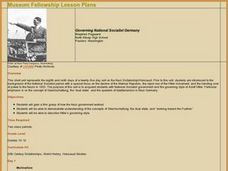Curated OER
Cartoons for the Classroom: Loosing Patients with the Recovery
Upper graders examine this political cartoon in order to better understand feelings toward the economic recovery. There are three discussion questions to accent the learning.
Curated OER
Hitler's Fatal Gamble
Students consider the differences between totalitarianism and democracy. In this comparative politics instructional activity, students will read a handout describing the major components that comprise totalitarianism and democracy,...
Curated OER
The Cold War Warrior Defending: The Moral Beacon of the World
Students identify President Reagan's domestic and foreign policy, describe America's attitude toward communism, list characteristics which endeared Reagan to the American people, and explain why some Americans spoke out against Reagan's...
Curated OER
American Justice on Trial
Students role play a trial in which they consider if the United States government violated the rights of Japanese Americans after Pearl Harbor.
Curated OER
Deportation and Loss
Seventh graders discuss the issues of isolation and deportation as they are related to the Holocaust. After reading a brief passage about deportation and confinement in a concentration camp, 7th graders discuss the feelings involved in...
Curated OER
Anne Frank: The Diary of a Young Girl
In this unit, students examine the many different themes in Anne Frank's diary. They connect the themes to their own life and keep a journal to explore the triumphs and challenges in their own life.
Curated OER
The Good Earth - Essay Questions
In this literature worksheet, students respond to 6 short answer and essay questions about Buck's The Good Earth. Students may also link to an online interactive quiz on the novel at the bottom of the page.
Curated OER
Lessons from the Holocaust
Students discover what a dictatorship is by examining the holocaust. In this government lesson, students discuss the laws that were enacted for Nazis to take control of Germany, and the types of laws we have put place to prevent that...
Curated OER
The Diary of Anne Frank-Clash of the Clans
Middle schoolers read selected passages from The Diary of Anne Frank. They, in groups, discuss the television / movie characters and create character webs involving these characters and those in the Anne Frank book.
Curated OER
Governing National Socialist Germany
Young scholars spend a month discovering the role of the Nazi Dictatorship during the Holocaust. Using the internet, they research the history of the Nazi party and the decline of the Weimar Republic. They examine how Hitler rose to...
Curated OER
Charge and Defeat
Pupils discuss traditional tools used by historians and archaeologists. They conduct a debate on the advantages and disadvantages of rewriting the past and discuss which side of the debate has the strongest case.
Curated OER
Johnny Tremain
Students study the Revolutionary War. In this colonial America activity, students read Johnny Tremain by Esther Forbes. Students discuss chapter 1 as they respond to the provided discussion questions.
Curated OER
Calculus at the Battle of Trafalgar
Students read an article on how calculus is used in the real world. In this calculus lesson, students draw a correlation between the Battle of Trafalgar and calculus. The purpose of this article is the show everyday uses for calculus in...
Curated OER
The Trading Post with the Most: Colonial Dorchester's Settlement and Economy
Eighth graders explore the Dorchester settlement, In this American colonial history lesson, 8th graders examine primary resources and maps from the Dorchester trading post in order to learn about its contributions to the Revolutionary War.
Curated OER
Literature: Yoshiko Uchida Unit
Sixth graders read the books, The Invisible Thread: An Autobiography by Yoshiko Uchida and Baseball Saved Us by Ken Mochizuki about Japanese Americans during World War II. They hold discussions, take quizzes, and write essays about the...
Curated OER
President Richard M. Nixon- Reading Selection and Questions
In this President Richard M. Nixon activity, students read a two page biography about this president. They answer 8 multiple choice questions based on the reading.
Curated OER
The Invasion of Iraq
Students explore the war in Iraq. They use videos, newspapers, and other media to examine the circumstances leading up to the invasion, the war's major battles, and the post-war situation on the ground. Students read letters from Iraq...
Curated OER
Who is Robert M. Glass? - Black History Month
Students research the role of African Americans during the each of the United States' wars. In this African American history lesson, students research information and statistics about the role of African Americans in the following wars:...
Curated OER
Humanitarian Aid in Iraq
Students research the impact of the Iraqi war on the civilian population in Iraq. They read an article, participate in class discussion and consider efforts that are being made to alleviate difficult conditions.
National First Ladies' Library
Are We There Yet?
Pupils study the wide-reaching effects of the Cold War, even to its involvement in domestic road construction. They research the National Defense Highway System (Eisenhower Highways) for information about the creation of the program, the...
Curated OER
Charles Young Photographs
Students analyze photographs as an introduction to the Spanish American War. The concepts of American expansionism are explored through the process.
Curated OER
Breaking News English: World's Oldest Man Dies
For this English worksheet, students read "World's Oldest Man Dies," and then respond to 20 fill in the blank, 15 short answer, 8 matching, and 8 true or false questions about the selection.
Smithsonian Institution
Cuban Missile Crisis
The United States—specifically John F. Kennedy—played a large role during the Cuban Missile Crisis. A history resource poses questions that encourage critical thinking as well as in-depth analysis of images from the time period.
Curated OER
Teaching With Documents Lesson Plan: "A Date Which Will Live in Infamy"
Your class examines F.D.R.'s speech for examples of repetition, alliteration, emotionally charged words, etc. They listen to the speech and interview a person who heard it delivered. They finish by writing an article about the experience.

























